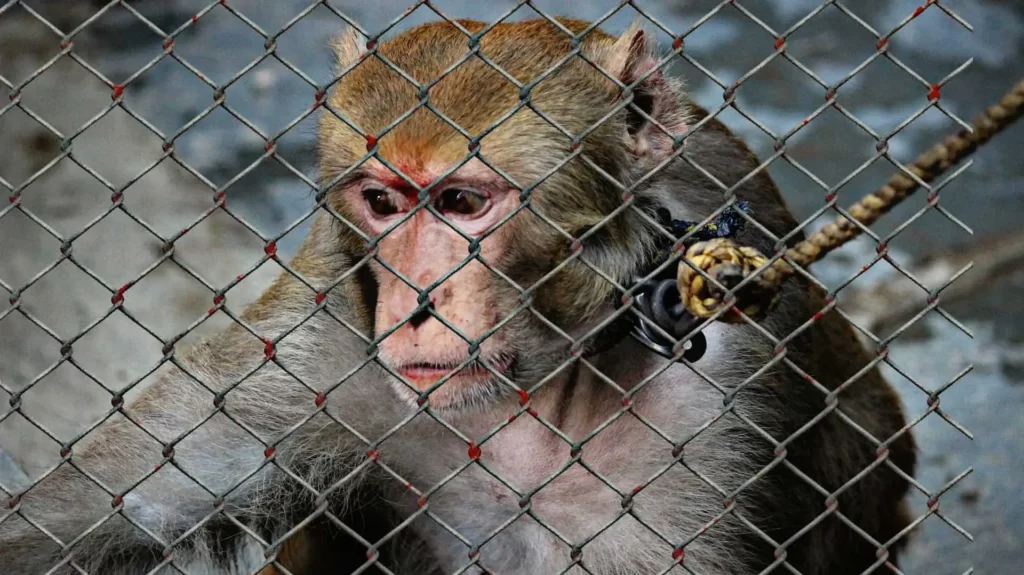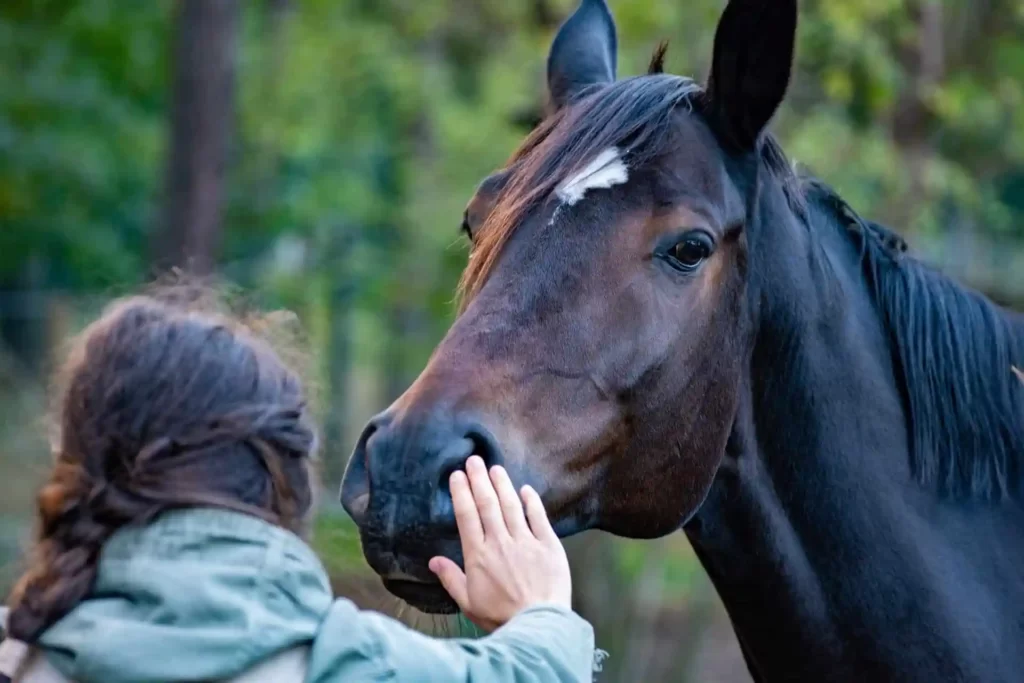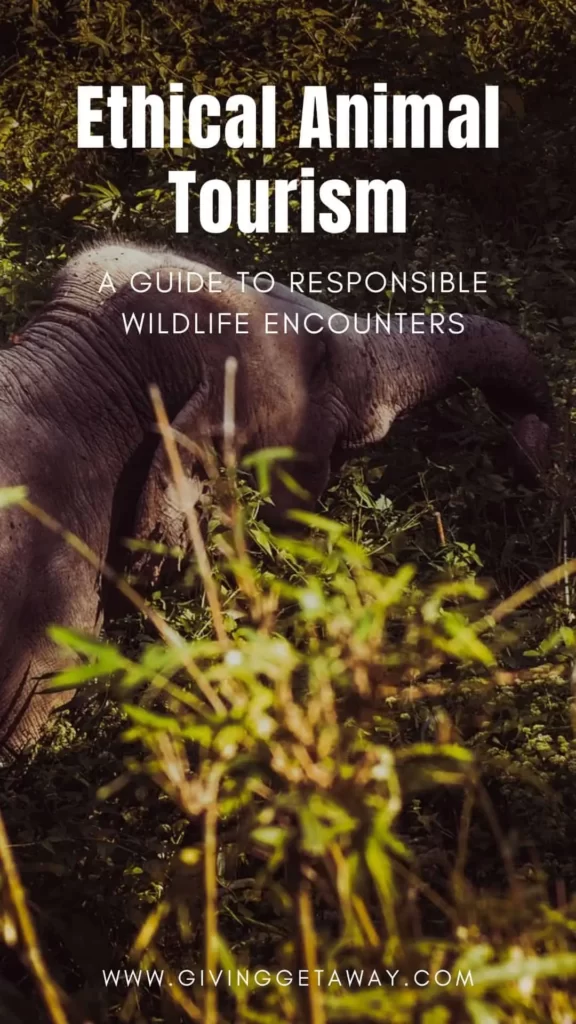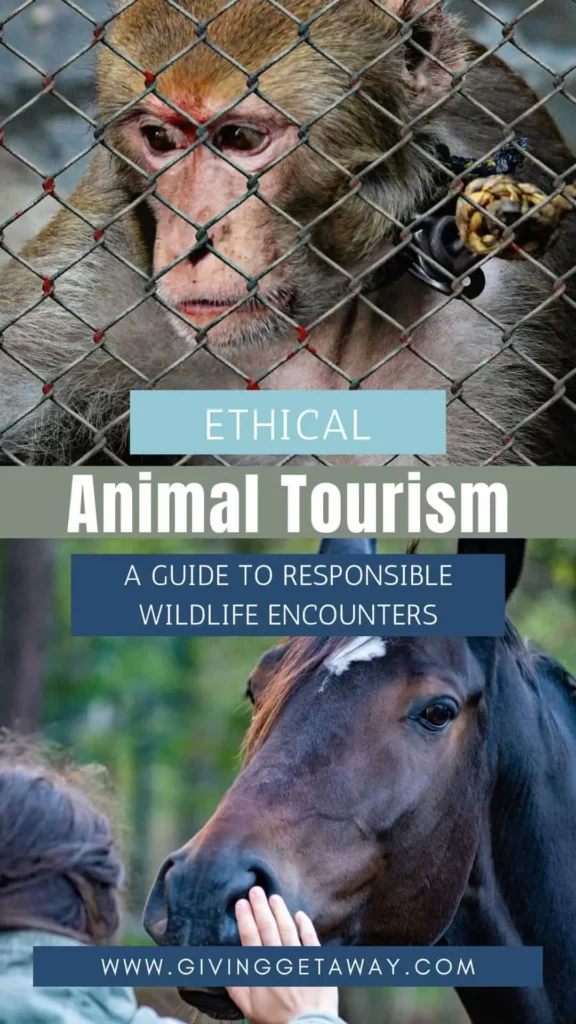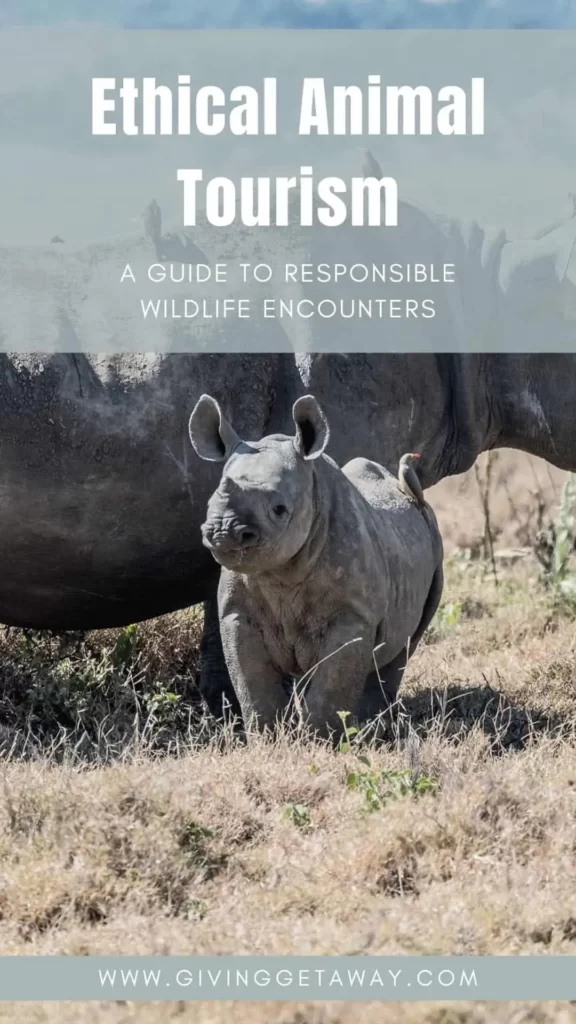| This post may contain affiliate links. Whenever you book or buy something through one of these, Giving Getaway gets a small commission, of which 100% will be donated to charity, without any extra cost to you! |
I am a huge animal lover, always have been, and always will be. As a child, I always imagined being on a wildlife safari while roaming through the bushes in the small forest next to our house. Twenty years later, I am exploring the world and its animals with the same curiosity I used to have as a child, but with more insights and knowledge about animal tourism, I sometimes wish I wouldn’t have. That’s why ethical animal tourism is such an important topic for me and a crucial part of Giving Getaway.
Animal tourism has become increasingly popular, offering tourists and travelers the opportunity to encounter wildlife up close. However, beneath the surface lie two crucial questions: Are these interactions ethical? And is their welfare prioritized, or are they merely commodities for human entertainment?
That’s why in this blog post, I would like to delve into the ethics of animal tourism and provide a guide to responsible wildlife encounters. By understanding and promoting responsible practices, we can ensure that our encounters with wildlife contribute to their well-being and conservation.
Understanding Animal Tourism
Animal tourism encompasses a wide range of experiences that involve human interaction with wildlife. These experiences can take various forms, such as wildlife sanctuaries, zoos, marine parks, and safaris. Wildlife sanctuaries aim to provide a haven for animals, often focusing on rescue, rehabilitation, and conservation efforts. Zoos, on the other hand, display animals in captivity, while marine parks showcase marine life through exhibits and shows. Safaris offer opportunities to observe and encounter animals in their natural habitats.
The motivations behind engaging in animal tourism are diverse. Some people seek educational experiences, hoping to learn about different species, their behaviors, and their habitats. Others are driven by the desire for entertainment, wanting to witness animal performances or have close encounters with exotic creatures.
However, animal tourism is not without its ethical concerns. The industry often faces criticism for the potential exploitation and mistreatment of animals. Animals in captivity often suffer from inadequate living conditions, restricted movement, and psychological distress.
Moreover, there are instances of animals being used purely for entertainment purposes, which can disregard their natural behaviors and well-being. It is essential to critically examine the ethical implications associated with animal tourism and consider how our choices impact the welfare and conservation of wildlife. So let’s have a look at the ethical issues in animal tourism!
Ethical Issues in Animal Tourism
In this section, I would like to discuss instances of mistreatment and abuse within the industry, the potential impact of animal tourism on conservation efforts, and the ethical implications of close encounters and human contact with animals. By examining these issues, we can strive for a deeper understanding of the challenges posed by animal tourism and work towards responsible and ethical practices that prioritize the well-being of animals and the preservation of their natural habitats.
Exploitation and Cruelty Towards Animals
Numerous reports and investigations have exposed instances of mistreatment and abuse within the animal tourism industry exposed through numerous reports and investigations. These distressing cases reveal animals subjected to harsh training methods, physical violence, and neglect. Pursuing captivating performances and interactions often leads to exploiting animals, disregarding their welfare and intrinsic value as sentient beings.
Animals held in captivity or confined within enclosures also face significant challenges that impact their overall welfare. The loss of freedom and restriction of natural behaviors result in stress, frustration, and a diminished quality of life. Improper handling practices, including rough treatment and mishandling during interactions, worsen the distress experienced by these animals. That’s why considering the long-term consequences of captivity and confinement is crucial to understanding the physical and psychological well-being of animals involved in animal tourism.
Conservation and Preservation
Animal tourism often asserts its role in supporting conservation efforts through fund generation and raising awareness. Some establishments claim that visitor fees and donations directly contribute to conservation programs, habitat restoration, and the protection of endangered species. It is important to thoroughly examine the extent to which these claims are fulfilled and how the allocated funds genuinely support conservation initiatives.
The evaluation of wildlife tourism initiatives is vital in assessing their effectiveness in safeguarding species and habitats. This evaluation process entails assessing whether these initiatives genuinely contribute to preserving and recovering endangered species, restoring natural habitats, and promoting sustainable practices.
Critical analysis of the outcomes of wildlife tourism programs is necessary, considering factors such as research efforts, educational initiatives, and the success of reintroduction or rehabilitation programs. By conducting such evaluations, we can determine the true impact of wildlife tourism on conservation goals and make informed decisions to promote responsible practices.
Human-Animal Interactions
Close encounters and human contact have a significant impact on animal behavior and well-being within tourism settings. Animals can become habituated to human presence, resulting in changes to their natural behaviors, such as feeding patterns, social interactions, reproduction, and overall stress levels. Understanding the implications of these close encounters is crucial in establishing ethical boundaries and protecting the welfare of the animals involved.
Direct interactions between humans and animals in tourism settings pose inherent risks that must be considered. Safety concerns arise when tourists and travelers are allowed to approach potentially dangerous animals closely or engage in activities that may cause harm. Additionally, disease transmission between humans and animals is a significant concern, as certain diseases can be transmitted back and forth.
Careful consideration of these potential risks is essential to ensure the safety and well-being of both humans and animals. Implementing measures to minimize these risks is important for fostering responsible and sustainable animal tourism practices.
Responsible Wildlife Encounters: Guidelines for Ethical Animal Tourism
Let us now have a look at essential guidelines and principles for engaging in animal tourism while prioritizing the welfare and conservation of animals. I will discuss how to make informed decisions, support conservation efforts, respect animal welfare and natural behavior, and contribute to education and awareness. By following these guidelines, you can ensure that your wildlife encounters align with responsible and ethical practices, making a positive impact on the well-being of animals and the preservation of their natural environments.
Research and Choose Ethical Animal Tourism Options
When it comes to engaging in animal tourism, it is very important to approach it responsibly and prioritize the welfare and conservation of animals. One way to ensure this is by only visiting accredited and reputable establishments. These establishments, accredited by recognized organizations or renowned for their ethical practices, follow specific standards of animal care, welfare, and conservation. By choosing such establishments, we can have the confidence that their experience aligns with responsible practices and contributes to positive outcomes for the animals involved.
It is also essential to look for animal tourism facilities that place a strong emphasis on education, research, and conservation. These establishments go beyond providing mere entertainment and strive to educate visitors about the importance of wildlife conservation and the challenges animals face in their natural habitats. Through educational programs, guided tours, and interactive experiences, they offer opportunities for a deeper understanding of wildlife and its conservation.
Additionally, supporting facilities actively involved in research initiatives and conservation projects aimed at protecting species and their habitats contributes to advancing scientific knowledge and preserving biodiversity. Feel free to read this post, where I highlight 10 ethical activities in Europe which emphasize both responsible animal tourism and education.
Support Conservation-Focused Initiatives
When it comes to supporting ethical animal tourism, it is crucial to prioritize sanctuaries and rehabilitation centers that truly prioritize animal welfare. These establishments offer a safe place for animals that have been rescued or require rehabilitation, providing them with a safe and nurturing environment. By choosing to visit and support these ethical sanctuaries and rehabilitation centers, you directly contribute to the well-being and care of the animals. They prioritize the animals’ natural behaviors, allowing them to recover, thrive, and, whenever possible, reintegrate into their natural habitats.
Also, demonstrating your commitment to wildlife conservation involves contributing to organizations actively engaged in conservation efforts. These organizations work tirelessly to safeguard wildlife and their habitats through various initiatives, such as anti-poaching campaigns, habitat restoration, research, and community outreach programs. By donating or volunteering with these organizations, you can play a vital role in funding critical conservation projects and ensuring the long-term sustainability and protection of endangered species.
Respect Animal Welfare and Natural Behavior
When engaging in animal tourism, it is crucial to support habitats that closely resemble the natural environments of the animals. Animals thrive when they have access to appropriate space, enrichment, and opportunities to exhibit their natural behaviors. Encouraging animal tourism establishments to create habitats that mimic their natural surroundings not only ensures the well-being of the animals but also reduces the stress associated with unnatural living conditions. By supporting establishments that prioritize the development of such habitats, you contribute to the overall welfare and quality of life for the animals.
Furthermore, it is essential to promote observation-based experiences rather than direct interaction when encountering animals in tourism settings. While the temptation to have close contact or engage in direct interactions may arise, it is crucial to prioritize the well-being and safety of both animals and visitors. Observing animals from a distance allows them to engage in their natural behaviors without disturbance or stress.
It respects their boundaries and mitigates potential risks associated with direct contact. By advocating for observation-based experiences, you actively contribute to the animals’ welfare and provide them with the opportunity to live as naturally as possible.
Educate and Raise Awareness
Education and awareness play a crucial role in promoting responsible and ethical animal tourism. Before visiting an animal tourism facility, take the time to educate yourself about their natural habitats, behaviors, conservation status, and specific challenges they face. This understanding allows for a deeper appreciation and respect for their existence, empowering you to make informed decisions and engage in meaningful discussions during your visit.
Besides that, sharing information about responsible and ethical animal tourism practices is crucial in raising awareness among your friends, family, and social networks. Spread the word about accredited establishments, conservation initiatives, and the importance of respecting animal welfare.
Encourage others to make informed choices when participating in animal tourism and foster a culture of compassion and empathy towards wildlife. By sharing this knowledge, you actively contribute to a collective understanding of the ethical considerations involved and inspire others to make conscious decisions when engaging in animal tourism.
Case Studies: Ethical Animal Tourism Examples
In this section, I want to present case studies of wildlife tourism destinations and programs that prioritize animal welfare and conservation. These examples serve as inspiring models, showing how responsible animal tourism can make a positive impact. By highlighting these exemplary practices, we can draw inspiration and encourage support for responsible animal tourism.
The Elephant Nature Park, Thailand
The Elephant Nature Park in Thailand is a great example of a wildlife tourism destination that prioritizes animal welfare and conservation. This sanctuary provides a haven for rescued elephants, allowing them to live in a natural and humane environment.
There you have the opportunity to observe these majestic creatures in their natural behaviors while learning about their stories of rescue and rehabilitation. The park actively fights against activities such as elephant riding, emphasizing the importance of treating elephants with respect and dignity.
The Galapagos Islands, Ecuador
The Galapagos Islands are renowned for their unique biodiversity and have become a prime example of responsible wildlife tourism. Strict regulations are in place to protect the delicate ecosystem and endemic species found on the islands.
You can explore the islands through guided tours led by knowledgeable naturalists who provide educational insights into the remarkable wildlife, including the Galapagos tortoise and marine iguanas. The focus is on preserving the natural habitats and raising awareness about the importance of conservation.
The Reintroduction of Black Rhinos in South Africa
Through collaborative efforts involving conservation organizations, local communities, and responsible tourism operators, black rhinos have been successfully reintroduced into protected areas in South Africa.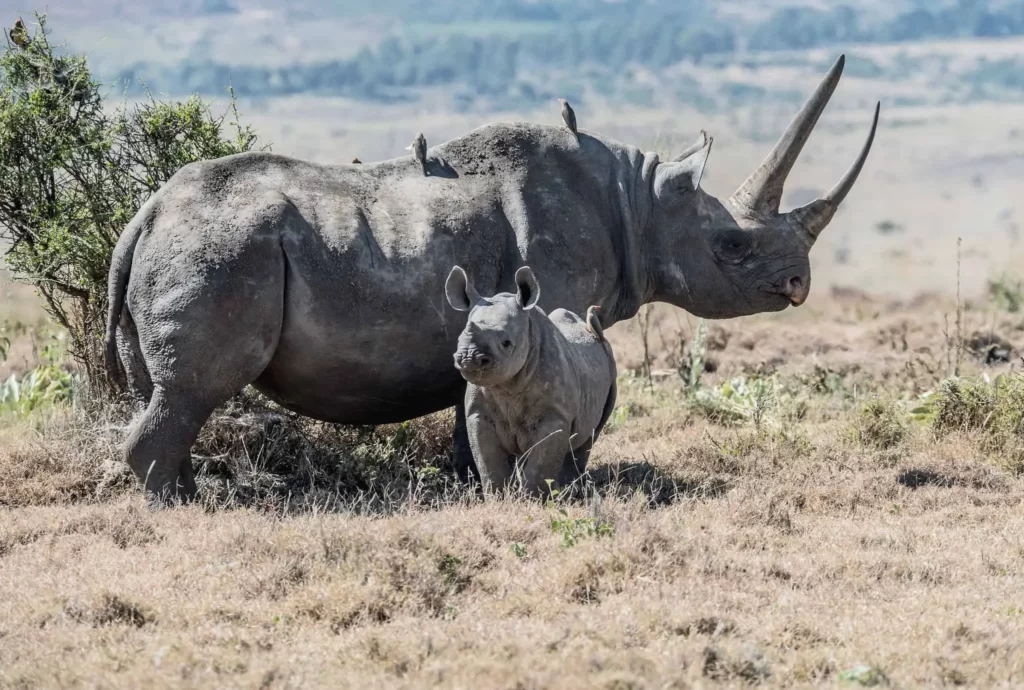
This initiative has not only led to the recovery of black rhino populations but has also provided employment opportunities for local communities and raised public awareness about the importance of conserving these magnificent creatures.
Community-based marine conservation in the Philippines
In the Philippines, community-based marine conservation initiatives have thrived, empowering local communities to actively participate in protecting and preserving marine ecosystems. Responsible tourism practices, such as guided snorkeling and diving tours, generate income for communities while promoting sustainable fishing practices and the preservation of fragile marine habitats. These initiatives have resulted in the recovery of coral reefs, the conservation of endangered marine species, and the socio-economic development of coastal communities.
These case studies illustrate the potential of ethical animal tourism to make a positive impact on animal welfare, conservation, and community development. By supporting establishments and destinations that prioritize responsible practices, we can contribute to the well-being of animals and the preservation of our planet’s biodiversity. These success stories inspire us to promote and engage in responsible animal tourism, recognizing its role in creating a sustainable future for both wildlife and humans.
Conclusion
Ethical animal tourism demands our attention and consideration. Throughout this guide, we have explored the various ethical concerns and provided guidelines for responsible wildlife encounters. By choosing reputable establishments, supporting conservation efforts, respecting animal welfare, and promoting education, it is possible to make a positive change.
By prioritizing the well-being of animals, preserving habitats, and promoting responsible tourism, we can create a harmonious balance between our desire to connect with wildlife and our commitment to their welfare and conservation. Together, we can shape a future where ethical animal tourism thrives, benefiting both animals and humans alike.
Are you ready to make a difference while traveling? If so, why not use the search widgets or click on the ad banners on this website to book your accommodations, flights, rental cars, and more? Your completed booking will earn a commission, with 50% of the profits going towards charity events like the 2021 Christmas gift drive for kids and teens in a children’s home in Montenegro.
So not only will you be enjoying a wonderful vacation, but you’ll also be contributing to a better world. Book your trip through our site and join us in making a positive impact today!


